TWENTY THOUSAND LEAGUES UNDER THE SEA
Why octopuses are having a cultural moment
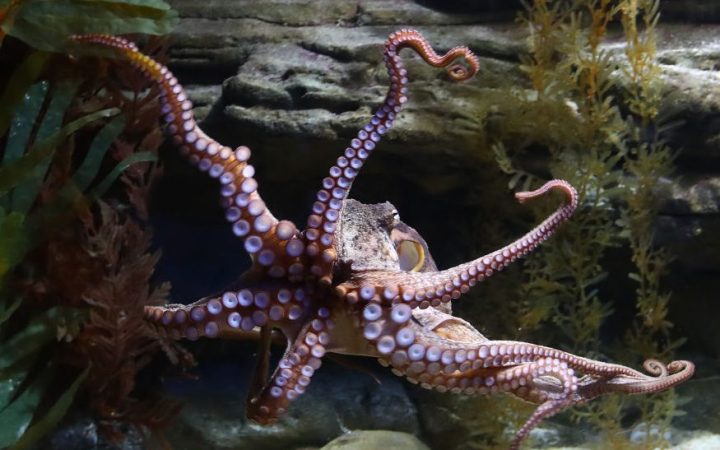
The topic of octopus intelligence has been heating up for years, and it recently reached boiling point following a proposal to start farming these creatures. How intelligent are cephalopods really? And what’s caused all the fuss?
Every generation has a film that sets off a pet animal obsession (pun partially intended). One could argue it kicked off with Lassie in 1943; in the sixties it was dolphins because of Flipper; in the seventies it was sharks because of Jaws; even pigs had some time in the limelight around Babe in the nineties. It’s harder to identify a top dog (so to speak) amongst the rapidly expanding jungle of 21st-century filmography, but one of the best contenders right now is the alien genius of the sea, the octopus, brought to our attention by the 2020 South African Oscar-winning Netflix documentary My Octopus Teacher.
For a very long time, our fascination with octopuses (yes, that is the plural, not “octopi”) has been with their bodies. They have eight tentacles, a bulbous head, a venomous beak, ink-spouting siphons, blue blood, three hearts and no bones. Top it off with their ability to change the colour and texture of their skin and squeeze their body into practically any shape, and it’s hard to imagine how they could be weirder.
Because of these traits, many cultures considered them mysterious and even mystical creatures, often symbols of transformation or destruction, and several ancient and modern mythologies imagine them and their cousins the squids as terrifying monsters, such as The Kraken, the giant squid in Jules Verne’s Twenty Thousand Leagues Under the Sea, or Cthulu in the cult writings of HP Lovecraft. It seems that only recently, because of increased scientific observation, our interest in octopuses has extended past their appearance to their intelligence.
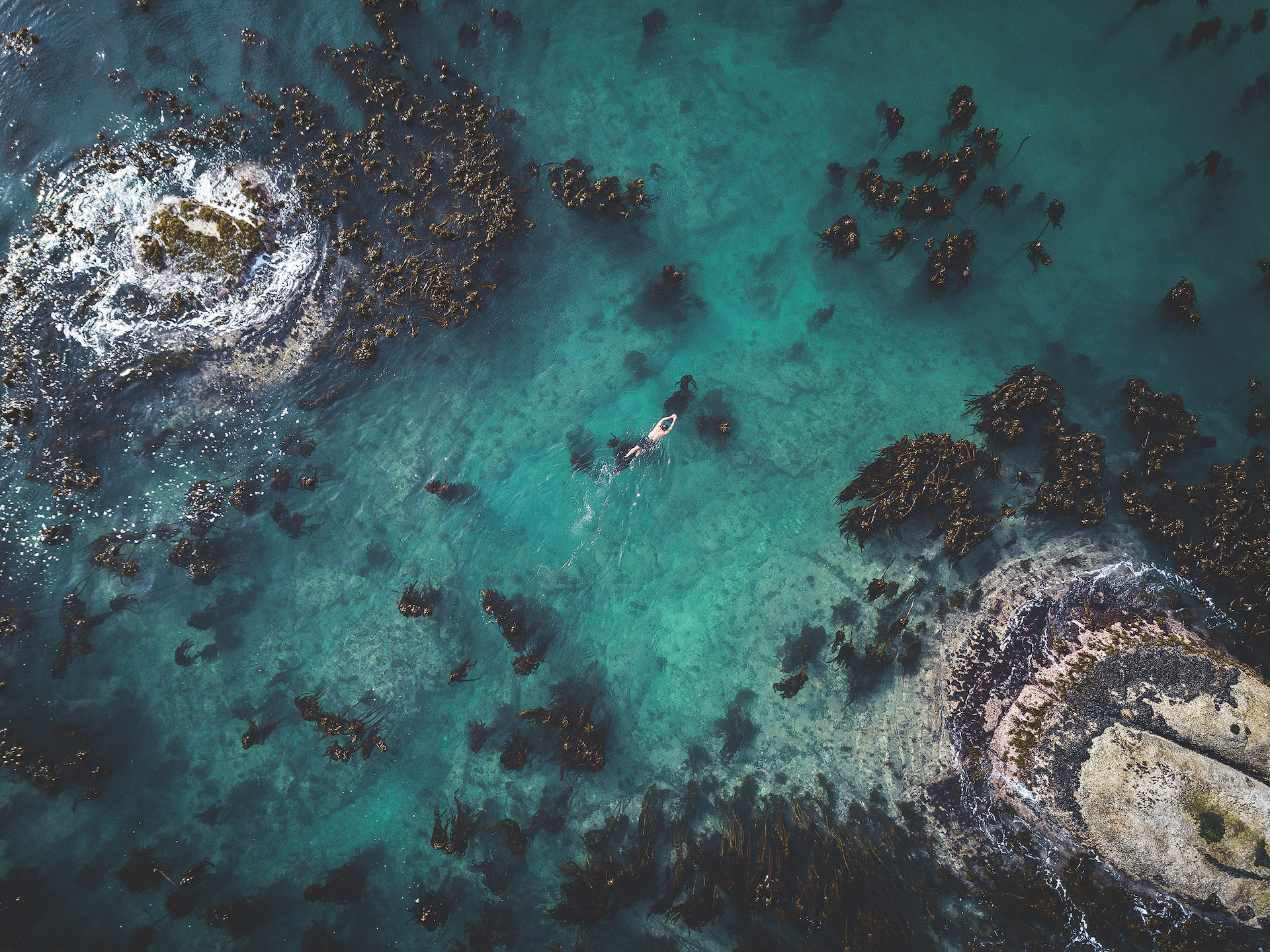
Production still from ‘My Octopus Teacher’. Image: Tom Foster
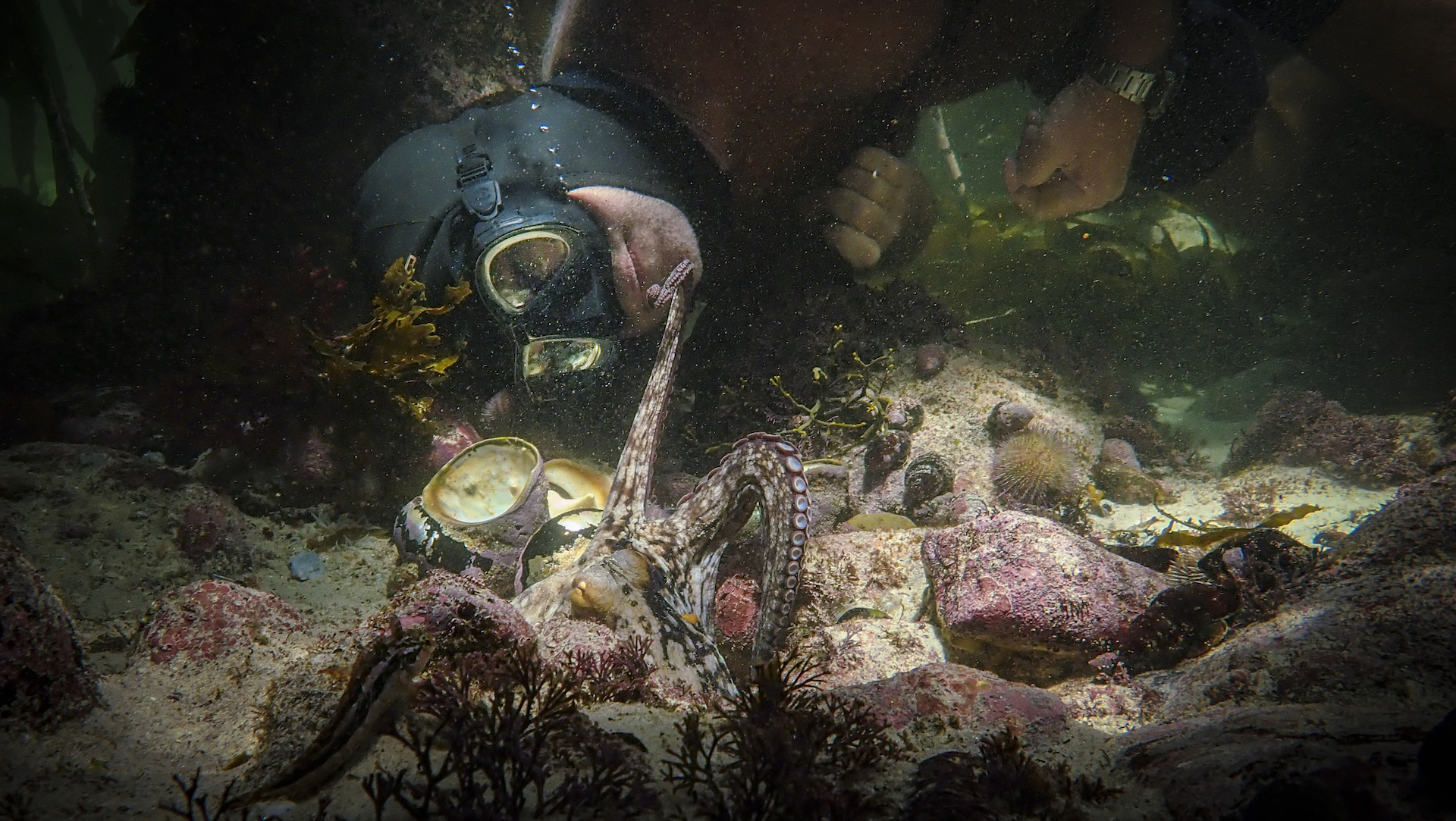
Production still from ‘My Octopus Teacher’. Image: Tom Foster
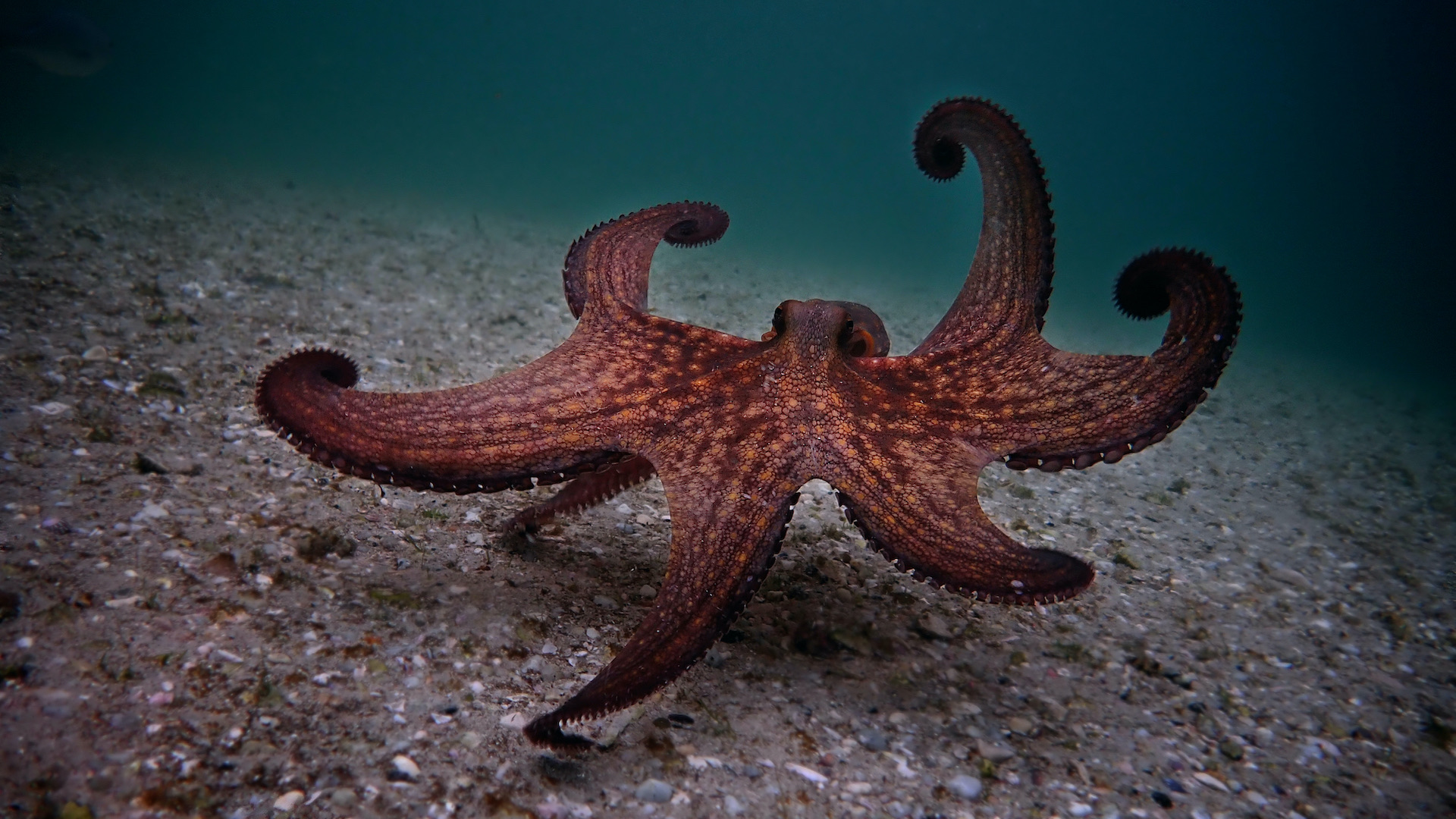
Production still from ‘My Octopus Teacher’. Image: Tom Foster
Possibly the reason we’re so surprised by discoveries of octopuses’ mental abilities is that we don’t expect to find intelligence in an animal so anatomically different from ourselves. Competitive creatures that we are, and dangerously insecure, having been at the top of the food chain for such a short portion of our planet’s evolutionary history, we are innately interested in and/or threatened by convergent evolution. It makes sense that we should be more comfortable with the intelligence of an ape with its familiar mammalian body plan than that of a cephalopod.
Octopus intelligence explained
Octopus intelligence is distributed in a totally different way than in mammals – rather than a centralised brain, their neurons are distributed throughout their head, tentacles and suckers, with about two-thirds located in their arms. This decentralised nervous system enables spectacular dexterity and complex movement, which they can use to problem-solve. We’ve observed them using tools, playing with objects and beating puzzles we set them in experiments in ways that had not even been considered. Their reputation as escape artists is not just because of their dexterity and contortionism, but also because their creativity differs from our own.
Octopuses are impressively adaptable, a trait we strongly associate with intelligence, able to identify new ways to use their abilities such as walking on their tentacles, using shells to protect themselves, or using their camouflaging bodies to mimic other animals. All of these feats stem from their impressive ability to remember and learn from past experiences. This is what the film My Octopus Teacher built a story around. And this is where the waters get a little murkier.
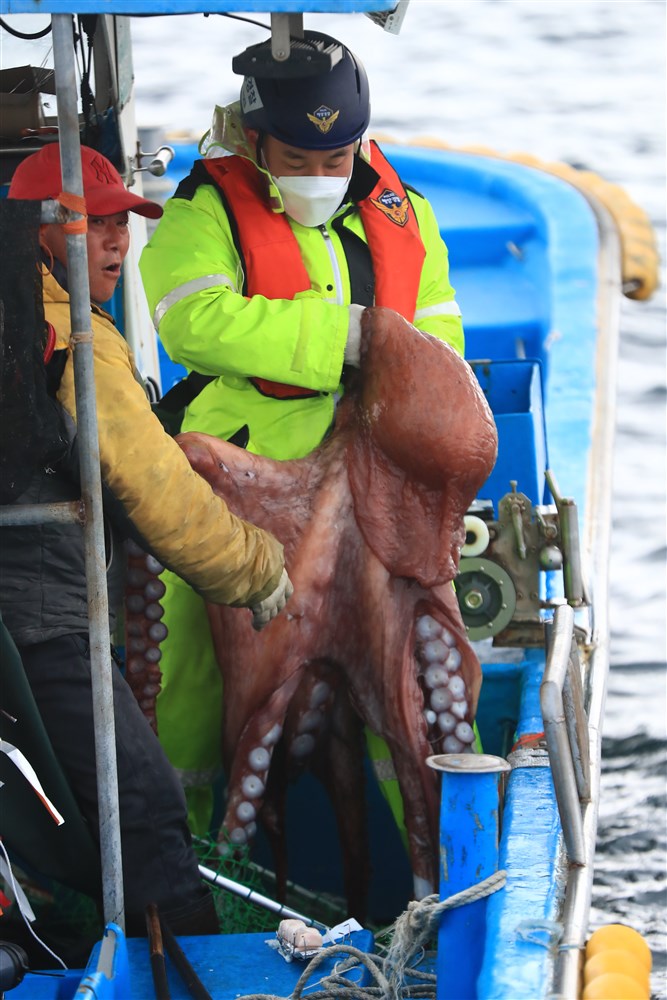
A fisherman (L) lifts a giant octopus with the assistance of a coast guard personal in the country’s northernmost Jeodo fishing grounds bordering North Korea in the East Sea at dawn, South Korea, 14 April 2023. Image: EPA-EFE / YONHAP SOUTH KOREA OUT
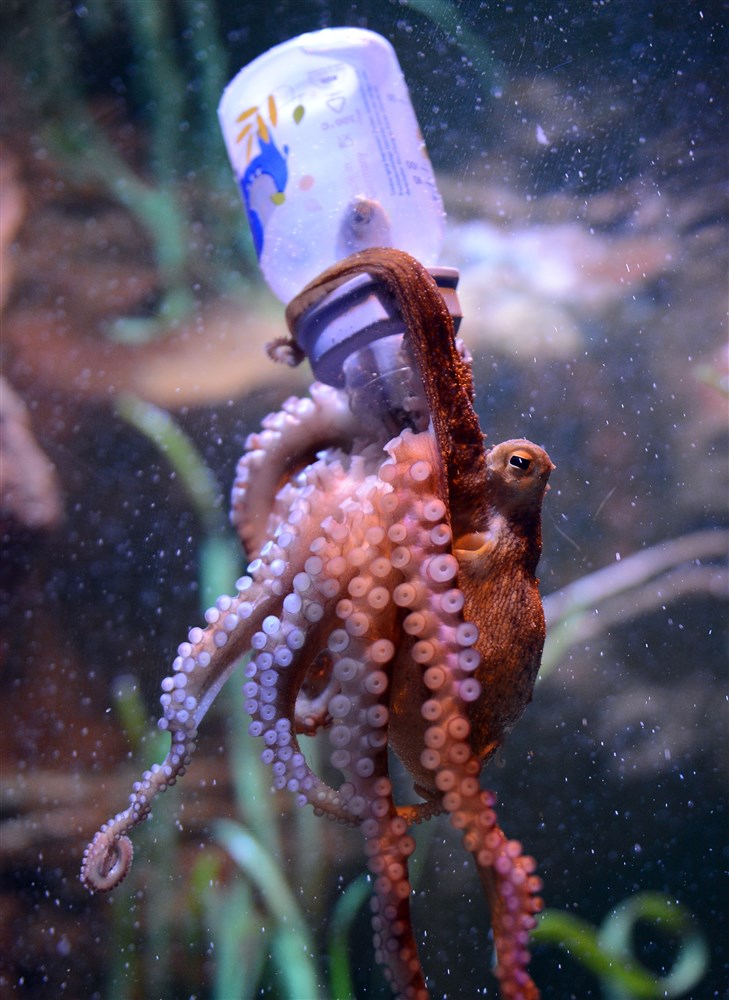
A young octopus tries to open a feeding bottle at Sea Life in Berlin, Germany, 15 October 2013. The young animal has been put into the aquarium after half a year in quarantine. His name is ‘Max – the brave’. Image: EPA / BRITTA PEDERSEN
My Octopus Teacher was a surprise success – its popularity spread organically on Netflix. It follows a year of filmmaker Craig Foster’s daily interactions with an octopus in a kelp forest near his coastal home. Foster’s descriptions of his enduring bond with the animal and mesmerising visuals by director Pippa Ehrlich transported audiences to a stunning underwater world at the frontiers of interspecies communication. At the heart of the film is a story that surprised a lot of people about what kind of relationship and communication is possible between a human and a cephalopod. This story is anecdotal, contentious, and most importantly, extremely anthropomorphic.
The reason we struggle to form bonds with most animals is that it’s difficult for us to interpret their behaviour. The animals we tend to think of as our friends are the ones whose behaviour matches most closely to the story we tell ourselves about them. We’ll never know which of those stories are true, even for animals as similar to us as cats and dogs (doubtless cat owners will swear that their furry friends stick around for love, not just for the free food) but it’s likely that we are better at interpreting the inner feelings of a dog than a snake or a dung beetle … or an octopus.
The Disney romance that Foster describes between him and the octopus in the film (there were, in fact, many octopuses filmed in the documentary) is told in human terms. The claims he makes about what the octopus is feeling or thinking are subjective interpretations of its behaviour that regards it as if it were a human.
Anthropocentrism is the tendency to view the world through the lens of human experience and perception, and it is an almost impossible bias to shake. It leads us to misunderstand the intelligence of non-human creatures, either by undervaluing their intelligence because of a lack of similarity to our own, or overestimating it based on its apparent similarity to our own. Anthropomorphic tales like that of My Octopus Teacher are guilty of the latter.
Unprecedented appreciation of octopuses
The film propagated an unprecedented appreciation of octopuses, which is by no means a bad thing, but it did so by representing their intelligence as similar to our own, and ascribing a human meaning to, for example, a “handshake” from an octopus’s tentacle, which could just as easily be to probe for food as an affectionate greeting. You may remember Paul the “psychic” octopus, who in 2010 was said to have predicted the outcome of eight soccer games in a row during the Fifa World Cup by picking from two plastic boxes with food in them – a fun, silly example of people ascribing arbitrary human significance to animal behaviour.
There are limitations to octopus intelligence that make it unlikely that they have similar perceptions of things to us. They breed only once in their lifetime and die shortly thereafter (a reproductive strategy called semelparity) and as a result, have a short lifespan of only one to five years, which limits the amount of time they have to learn. In their short lives, the complexity of their environment and number of opportunities for stimulating experiences has a drastic impact on their intelligence.
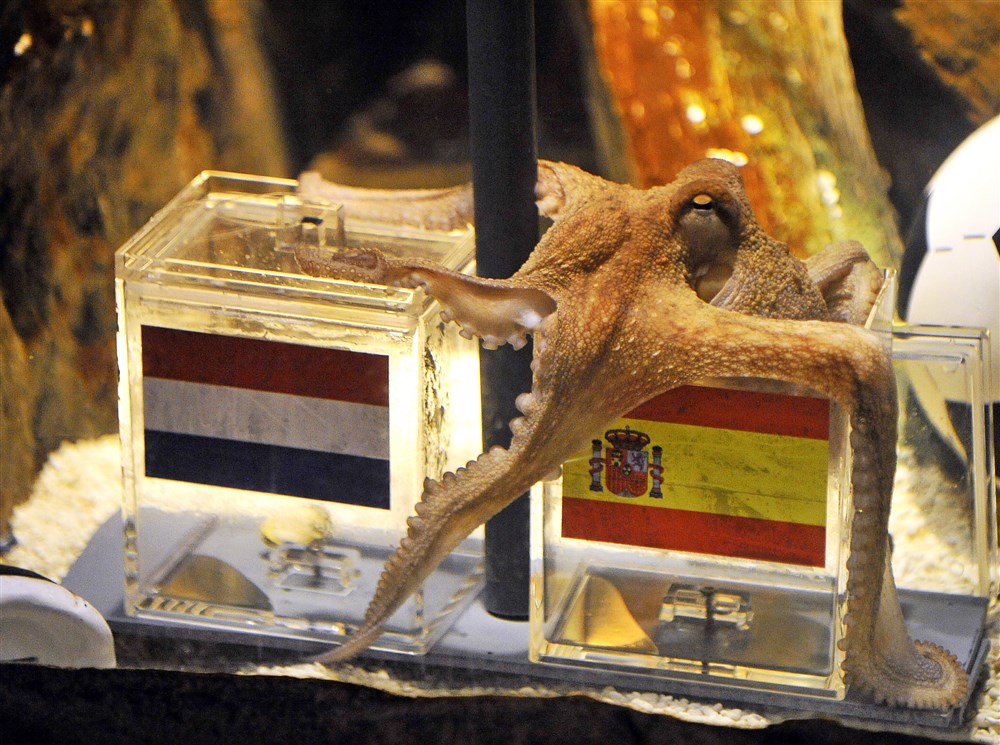
Octopus Paul, soccer oracle of the aquarium ‘Sea Life’, predicts a victory for Spain in the Fifa 2010 World Cup final between the Netherlands and Spain in his basin in Oberhausen, Germany, 09 July 2010. During the feeding, where he had to chose from two seashells, each contained in a plastic box with the Spanish and the Dutch flag on them, Paul picked Spain. Image: EPA/ROLAND WEIHRAUCH Nachrichtenbild

Russian President Vladimir Putin (L) touches an octopus in a laboratory of an oceanarium on Russky Island, near Vladivostok, Russia, 6 September 2012. The oceanarium serves as a tourist attraction as well a research facility. Image: EPA / MIKHAIL KLIMENTYEV / RIA NOVOSTI / KREMLIN POOL
Currently, the nature of one feature of their intelligence is crucial to the outcome of their species – their social structure. Until recently, octopuses have been thought to have had relatively simple, solitary social structures, a claim made extensively by Jennifer Mather, the Canadian marine biologist who acted as the scientific advisor on My Octopus Teacher, largely based on fieldwork from the seventies and eighties. Whether this is the case is an important factor in whether or not seafood producer Nueva Pescanova will be allowed to open the world’s first octopus farm in the Canary Islands.
Breeding in captivity
Scientists have struggled to breed captive octopuses in the past because of the unwillingness of breeding pairs to “cooperate” in an unnatural setting and because the larvae only eat live food. But the knowledge and resources to get it right now exist, and this scientific breakthrough has come at a rather unfortunate time for those who stand to profit from it – shortly after a documentary about how great and smart octopuses can be, won Best Documentary Feature at the 93rd Academy Awards.
Leaked documents obtained by Eurogroup for Animals revealed that Nueva Pescanova’s proposal involves housing large numbers of octopuses in about 1,000 lit-up tanks and killing them when they reach maturity by placing them in -3°C water. It doesn’t sound like a particularly good life, or a particularly good death either. Octopuses typically live in darkness, so the light may be uncomfortable for them. And studies of fish slaughtered similarly suggest that it would cause the octopuses to die slowly under a lot of stress; the jury is still out on whether living in groups would bother the animals.

A woman buys a barbecued octopus tentacle at a night market stall in Shenzhen, China, 5 December 2017 (issued 06 December 2017). Image: EPA-EFE / STRINGER
The problem for animal rights advocates is that they need to avoid leaning too heavily on the ethical problems with farming and eating intelligent animals because those arguments apply just as well to the cattle and pig-farming industries, which are an ingrained part of our economies – controversially so. If the issue of farming mammals gets roped into the discussion, the Spanish aquaculture company will likely be afforded a lot more support from agricultural authorities and companies.
The issue is complicated even further by confusion about what octopus farming would mean for their survival in the wild. Octopuses are a very popular delicacy around the world, and it’s possible that their mass production in captivity would make sea fishing less financially viable and allow their wild populations to flourish. The overlap of animal lovers and scientifically minded environmentalists is probably giving certain people a splitting headache when it comes to this issue.
Read more in Daily Maverick: The Morality of Octopus Hunting in False Bay
But when we ask the question “How intelligent is an octopus?” we are searching for similarities between their abilities and our own; and when you think about the notion that their continued survival in the wild and treatment as a species is contingent on how similar we consider them to be to ourselves, it’s nauseatingly apparent just how narcissistic we are as the ruling species on earth. DM/ML



Perhaps your view is guilty of the former (underestimating their intelligence)? The conversation around humanity’s casual indifference to the plight of sentient life in food production needs to be had. There are three compelling points around this: 1. The wasteful inefficiency of animal production for food in the light of it being the one of the leading drivers of environmental degradation, greenhouse gas emissions and species extinction. 2. The over consumption of animal products has been shown to have serious and widespread health risks that have enormous economic consequences. 3. The way sentient animals are treated as mere production units in industrial farms purely for the sake humanity’s taste preferences is immoral, to put it very mildly.
I fully agree Brian.
Well said, Brian. If I was clever enough you might have taken the words from my mouth.
Great piece, but I would not think it correct or legitimate to refer to evolution of high levels of intelligence in genetically remote life forms as convergent evolution. Octopuses’ and humans’ nervous systems are both highly evolved, but have not in any evolutionary sense converged on each other through natural selection imposed by the same set of environmental drivers and filters